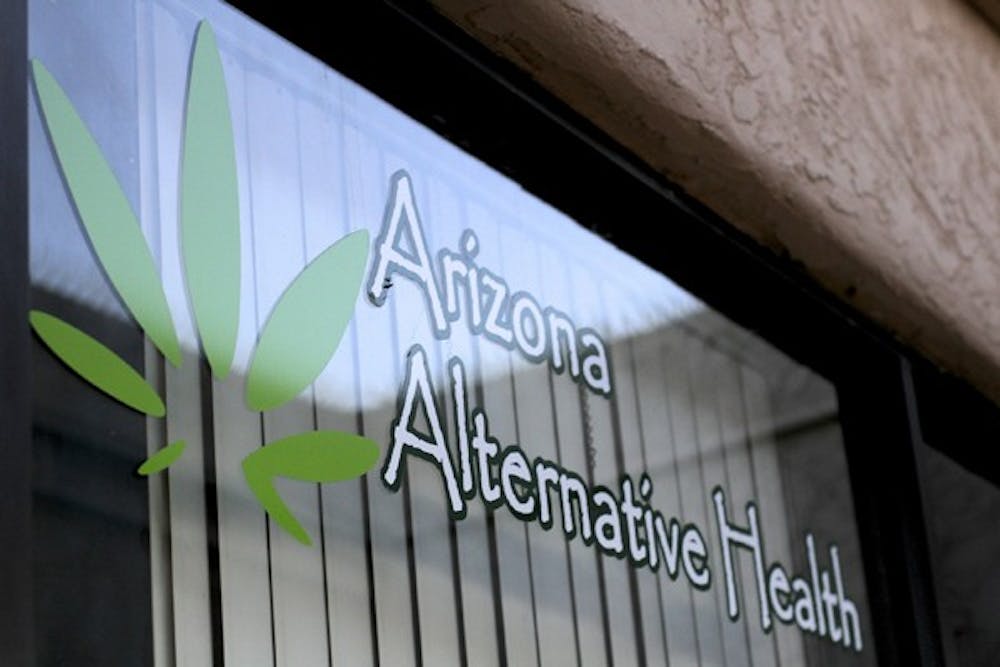 Arizona Alternative Health on Southern Avenue and McClintock Drive offers Tempe residents the opportunity to do a free screening for medical marijuana cards. (Photo by Sam Rosenbaum)
Arizona Alternative Health on Southern Avenue and McClintock Drive offers Tempe residents the opportunity to do a free screening for medical marijuana cards. (Photo by Sam Rosenbaum)A Maricopa County judge is waiting to decide if federal law pre-empts state law when it comes to medical marijuana, a ruling that could set a precedent to challenge similar laws in other states.
Maricopa County Superior Court Judge Michael D. Gordon said he would make a prompt decision following Friday’s arguments over the validity of the Arizona Medical Marijuana Act under the federal Controlled Substances Act.
White Mountain Health Center owner Butch Williams sued Maricopa County, Maricopa County Attorney Bill Montgomery, Arizona Department of Health Services and its director, Will Humble, after the county refused to issue him the certificate needed to begin operating a medical marijuana dispensary.
Lead attorney Jeffrey Kaufman argued on behalf of White Mountain.
“If the judge rules against White Mountain, all distribution of medical marijuana will be illegal,” Kaufman said at a hearing Friday. “I would encourage collectives to close in that event.”
Williams was the only person to submit an application to open a medical marijuana dispensary in the Sun City community health analysis area.
Only one proposed dispensary is allowed in each of Arizona’s 156 CHAAs.
Montgomery, who has taken the lead in defense of the county, said in court that marijuana has no medical properties and the issuance of a permit for dispensaries to sell or grow marijuana would be a direct violation of federal law.
“There is no such thing as medical marijuana,” Montgomery said in his argument. “It doesn’t exist under the federal Controlled Substances Act.”
Economics sophomore Zachary Wilhelm said it would be a waste of money to make medical marijuana illegal because the government would have to spend a lot of money to regulate it.
“There aren’t good enough reasons for it not to be legal,” Wilhelm said.
Marijuana is classified in the federal Controlled Substances Act as a Schedule I drug, the same category as heroin and LSD.
Wilhelm disagrees with the classification. Tobacco is much more harmful than marijuana, he said.
Montgomery said county officials could face federal prosecution for processing paperwork to open dispensaries.
American Civil Liberties Union attorney Ezekiel Edwards spoke on behalf of White Mountain and rebutted Montgomery’s statement.
He said Arizona is one of 17 states that have allowed medical marijuana and the federal government has never punished any of them.
“Arizona has expressed its sovereignty with the Arizona Medical Marijuana Act,” Edwards said.
Williams, an eight-year medical marijuana user, once suffered from kidney failure and now battles rheumatoid arthritis.
He will have to get his medication in another way if his side loses the lawsuit.
Williams said he picked the northwest Phoenix area because it is mostly a retirement community.
After witnessing his father struggle and pass away from brain cancer in 2009, he wants to offer a healthier alternative to medications that produce harmful side effects, he said.
The Arizona Medical Marijuana Certification Center helps patients obtain medical marijuana cards by collecting their information and submitting it to the Arizona Department of Health Services for a $150 fee.
The center’s office assistant, Robert Chalup, said the average age of a medical marijuana patient in Arizona is 52 years old.
There are more than 30,000 medical marijuana patients in the state of Arizona.
“It’s what the people want,” Chalup said.
Keep AZ Drug Free chairwoman Carolyn Short said she opposes the opening of dispensaries because they facilitate crime in their immediate surroundings.
Williams said the idea that opening dispensaries will result in crime is a common misconception.
He said dispensaries can make areas safer with increased police vigilance, and can provide many jobs for the unemployed as well as retract business from illegal drug sales.
“Making dispensaries legal will only put a dent in illegal drug activity,” Short said.
Patients already have access to their medication through patient-to-patient networks called collectives.
Patients grow the plants and share them with other patients while charging a donation fee for some of their product.
Medical marijuana caregiver Tynon Taylor said he believes collectives are a much better option than acquiring the drug elsewhere.
“Marijuana will be out there on the streets no matter what,” Taylor said. “Collectives offer a safer and more comfortable place for patients to get their meds.”
Reach the reporter at adrian.martinez.1@asu.edu




